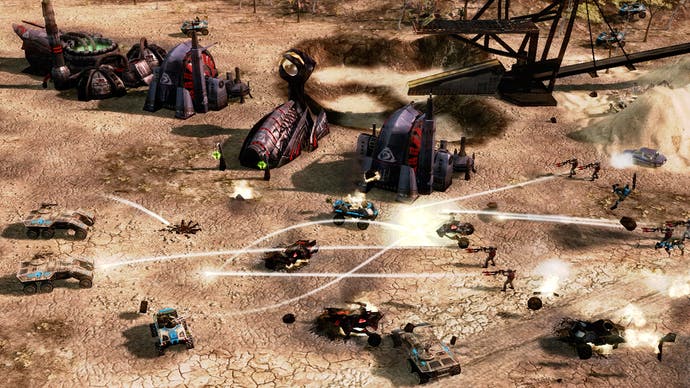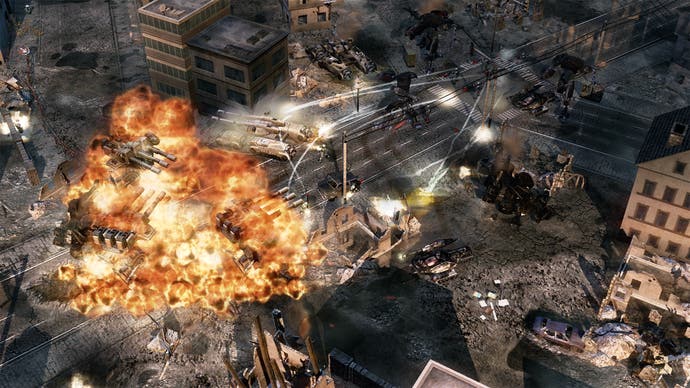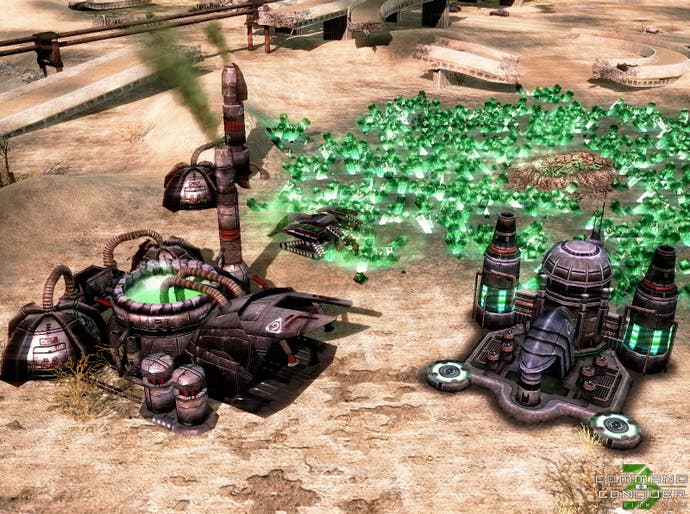Command & Conquer 3: Tiberium Wars
Mike Verdu teases us about Tiberium.
When EA planned to show off Command & Conquer 3: Tiberium Wars at the Le Meridien hotel in Piccadilly, Polonium 210 was just a rare and highly radioactive metalloid, chemically similar to tellurium and bismuth (thanks Wikipedia!). But by the time the game's executive producer, Mike Verdu arrived on a wearying whistlestop tour to demonstrate the game, Polonium 210 had become synonymous with stealth, secrecy, and, of course, lethal poison, thanks to the tragic assassination of Alexander Litvinenko, just a few doors down the road.
Still, it's not all bad: at least Polonium 210 provides a pithy intro to a game featuring its own fair share of stealth, lethal substances, and secrecy. Specifically: the game features a return to the classic C&C universe, and thus the stealthy and devious forces of Nod; it also means a return to Tiberium, and apparently long-term low-level exposure to the Tiberium causes illness and (lethal) death (thanks again Wikipedia!); and unfortunately the hands-on bit of the afternoon is under embargo, because of EA's secrecy, so you won't be able to read about it till next month.
What you will be able to read, however, is an interview with Mike Verdu himself:

That's a question that we struggle with on a daily basis because the truly hardcore guys really have issues with any big change that you make. Ultimately I think we win them over by delivering an experience that connects them emotionally with the game and that means the gameplay working with the story working with the multiplayer. It really needs to come together in a way that the whole is greater than the sum of its parts. If we pull that off they'll forgive us for changing the way Tiberium looks and some of the other things that we've done to pull the world together a little bit, to define the look and feel of the units and the structures.
But people who have played the game do say that this is a Command & Conquer game; that it feels like C&C. And as fans of C&C ourselves, we think that for anyone to say that is the ultimate compliment, and it gets us fundamentally where we need to be. And yeah, it feels very familiar, but there's also a lot of power and flexibility and new stuff working under the hood, and so we're hoping that the initial familiarity will draw people in to experience everything else that we have to offer in the game.

There are two things that I think are very interesting. The first is that I don't think anybody else is connecting players with a story as deeply as we do. We've got more than 35 single-player missions all tied together with a story fabric that's not just in the live action and the cut-scenes. They're still cool, but the story lives everywhere - it's in the mission objectives, it's in facts you collect about the world as you go, it's in conversations you overhear on the battlefield. It's really everywhere, and to have a story that has richness and depth and complexity and characters that change as they learn about the story and themselves, and conflicts that resolve... I mean it operates on different levels, it has themes that resonate throughout the campaigns. I just think that for a story experience you're not going to be able to beat C&C 3.
And then there's the multiplayer things that we're doing with spectator modes and tournaments and the reputation system and match broadcasts and all this other cool stuff. We're creating what I think is a competitive RTS. And that's also something that I think will set C&C 3 apart - the amount of support that's in there for the community to link up.
The campaigns are divided up into theatres of war that are geographic locations. You actually get to pick the order of missions that you play and the choices that you make in those missions ripple forward into the other missions. So there are definitely meaningful choices that you make.
We're taking lessons that we've learned in Generals and the Battle for Middle-Earth series, and in Red Alert, and we're combining all of it with some things that we think are timeless from the original C&C. I think we're drawing lessons from everything we've done, and hopefully that should come through.
Overall? The sense that when I play the game that it's a C&C game that honours the legacy of C&C. That's my favourite thing about the game. Very specifically, I think the in-game user interface is my favourite thing as a feature, because to be in the middle of a battle and to pull up my vehicle tab and quickly manufacture some new Mammoth tanks is pretty powerful, and it's something that no other game gives me. That's also unique and cool.

One thing that we wanted to do was to take a page out of Zero Hour's book and let you play against opponents who embody a style of play that is classic - like rushing or turtling. Or you can play an opponent who uses some combination of classic tactics - maybe rush and then turtle, or maybe a tank rush, or maybe tech up to perform air attacks. So that really grants the skirmish some dimension that it hasn't had up till now. And occasionally I just like to play a turtling game where you can build up your army in peace and have at it late in the game, and to have an AI that lets me do that is cool.
I really think that mix of fast, fluid and fun gameplay that has this timeless C&C quality with an epic story is an experience that we haven't had for a while and will actually feel new to people.

